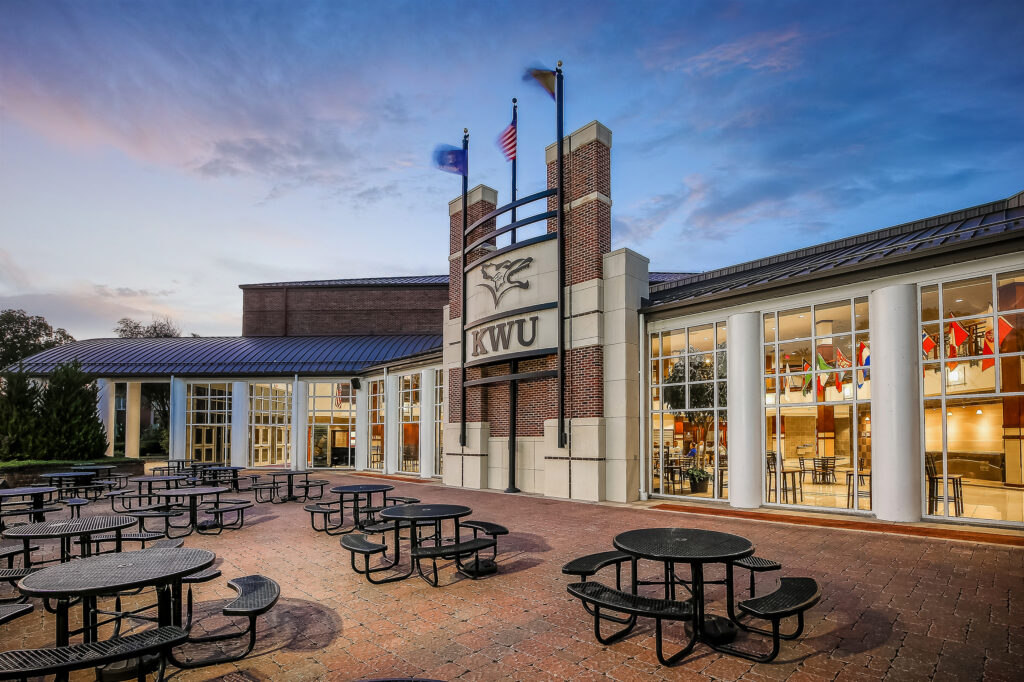Dustin Sahlmann is like any other coach: He wants his Kansas Wesleyan men’s volleyball team to be successful and works tirelessly to make it happen.
“My philosophy is I want our players be competitive in three things — on the court, in the classroom and, once you leave here, in your job,” said Sahlmann who is entering his second season.
One takes immediate precedence, though.
“I think the easiest impact I can have immediately is in the classroom,” he said. “Obviously, I’ve got to build a roster and I’ve got to build talent. But if I can get their heads wrapped around what we’ve got to do on a daily basis in school — because we are student-athletes, not athlete-students — that can set the tone early.”
“If we’re going to talk about being at a place with high expectations, that has to correlate off the court in the classroom,” KWU Director of Athletics Miguel Paredes said. “That’s something we strive to do here, and it’s been going on for quite some time.”
Results show that it’s been successful.
- Twenty of 25 sports teams received NAIA Scholar Team recognition.
- 63.1 percent of student-athletes (350 total) had a 3.0 GPA or better for the spring semester; 233 had a 3.5 or better.
- Fourteen teams improved their cumulative GPA from 2021-22.
Sahlmann’s team raised its cumulative GPA by a department-best 0.56 during the 2022-23 school year. Overall, athletics finished with a 3.14 cumulative GPA.
“For us as coaches, as educators, we have the opportunity, the power to influence our students to always strive to be at their best. We’ve got to make sure that we’re doing our due diligence to help them prepare for what happens,” Paredes said. “The bad thing about sports is sports will retire you before you can retire it. I tell people I don’t have coaches; I have teachers.”
The department’s academic endeavors are led by Ryan Showman, who coaches the women’s basketball team and is assistant athletic director for student experience, a position he assumed in March 2021.
“It’s a long road, because I’m asking coaches to do different things,” he said. “I’m asking them to have meetings with me, I’m asking them to meet with their players who are struggling. I asked a lot of these coaches to be able to get where we are now.”
Showman established a committee of head coaches to help monitor things during the year. It featured a department-wide study hall with time requirements and tutor services. He also met individually with each head coach every two weeks to discuss academics.
“It was a lot of work for me, it was a lot for the other coaches, especially when they’re in season,” he said. “Now they know the expectations, they have owned their academic success.”
“At the end of the day, we’re producing individuals who can have great impact in a positive way on society,” Paredes said. “I think athletics is part of a life-learning tool to help individuals learn how to deal with adversity. How to deal with it correlates to how you learn in the classroom.”
KWU’s Albert Nelson Student Success Center, led by J.D. Koons, assistant vice president for student engagement and success, plays a vital role.
“It’s another resource for our student-athletes to be able to take proctored tests, review papers, help study, help with time management — anything and everything,” Showman said.
“To have that extra resource — not just a professor or a coach but someone else they can go to and get help — has been incredible. It’s very much an active part of what we’re doing academically.”
Sahlmann agrees.
“When I arrived, Coach Showman was fantastic with helping me navigate through how we were going to handle and approach things,” he said. “Having the Student Success Center and that support was huge.”
Sahlmann’s student-athletes are required to attend 10 hours of study hall each week; the number is reduced if they have a 3.0 GPA.
“It’s part of being in my program,” he said. “For me to enforce that, I’ve got to have the support of everybody else, and that’s easily done here.”
Story by Bob Davidson


